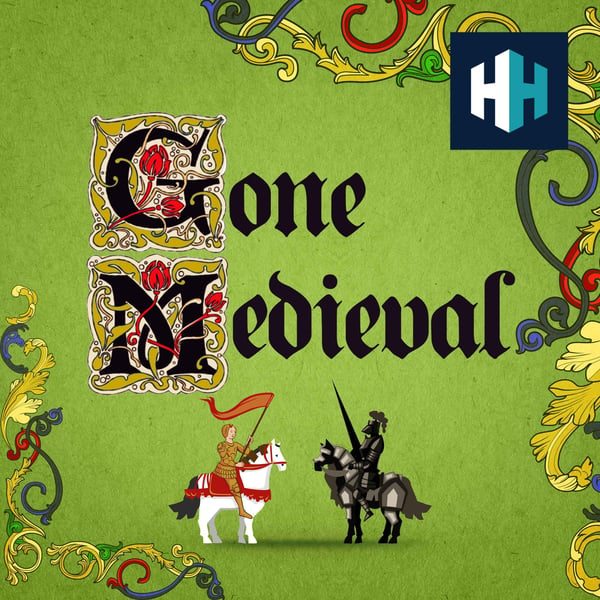The Witan: England's First Parliament?
Gone Medieval
History Hit
4.6 • 2.2K Ratings
🗓️ 26 April 2024
⏱️ 43 minutes
🧾️ Download transcript
Summary
Athelstan, grandson of Alfred the Great, was a great king who united what was once a collection of petty Anglo-Saxon kingdoms into one vast English domains. Having brought together rival polities with a history of fractious relations into a unified whole, Athelstan needed to centralise government if he was going to keep the crown on his head and hold England together. Anglo-Saxon rulers had often consulted their senior nobles and clergy in councils. With Athelstan’s rule came the emergence of a national form of this council, the Witan, an early precursor to Parliament, and one of the first forms of English government.
In this episode of Gone Medieval - the final part of our mini-series on the kingdoms of Anglo-Saxon England - Matt Lewis talks to Dr. Levi Roach about the Witan, and whether it can be considered to be the first form of English governance.
This episode was edited by Ella Blaxill and produced by Rob Weinberg.
Enjoy unlimited access to award-winning original documentaries that are released weekly and AD-FREE podcasts. Get a subscription for £1 per month for 3 months with code MEDIEVAL - sign up here.
You can take part in our listener survey here.
Transcript
Click on a timestamp to play from that location
| 0:00.0 | Athlstan, grandson of Alfred the Great and arguably the first king of England was a great ruler. |
| 0:21.2 | His reign united what was once a collection of petty Anglo-Saxon kingdoms into one vast English domain, laying the foundations of one of medieval Europe's greatest nations. |
| 0:34.0 | It was a stunning achievement, but perhaps not his most long-lasting. |
| 0:38.0 | Having brought together rival polities with a history of fractious relations into a unified whole, |
| 0:45.2 | Athustan needed to bring unity to what were otherwise separate tribes and distinct groups of people. |
| 0:52.3 | He needed to centralize government and be practical if he was going to keep |
| 0:57.0 | the crown on his head and hold England together. And Greg Saxon rulers had often consulted their senior nobles and clergy in councils. |
| 1:06.4 | With Atholstan's rule over all of England came the emergence of a national form of this council, the Wittan, an early precursor to parliament |
| 1:16.8 | and one of the first forms of English government, the body had some surprising powers. |
| 1:23.0 | Welcome to Gone Medieval, I'm Matt Lewis, and in this the final part of our mini series on the |
| 1:28.4 | kingdoms of Anglo-Saxon England, we wanted to find out more about how Anglo-Saxon government worked. |
| 1:35.0 | So in this episode we're talking about the Wittan and whether it can be considered to be the first form of English governance. The Witan was symbolic for many reasons. |
| 1:47.0 | It marked the very beginnings of an English national identity. |
| 1:51.2 | It was an early example of the centralization of power and a sure way for a monarch to illustrate their authority as a unique and all powerful leader. |
| 2:02.0 | But in literature and legend, understanding the Wittan can be difficult. |
| 2:08.4 | So we're going to get to the bottom of this instrumental Anglo-Saxon institution and uncover how and why it was created. |
| 2:16.6 | Which illustrious characters were part of it? |
| 2:19.4 | What powers did its members actually have and what influence did they hold over the monarchy? |
| 2:25.8 | How much does the Wittan really compare with a modern parliament in the UK today? |
| 2:32.1 | And what happened to it? To answer these questions, I'm joined by Dr. Levi |
| 2:37.8 | Roach. Levi is deputy head of archaeology and history at the University of Exeter and has written books which include |
| 2:45.6 | Kingship and Consent in Anglo-Saxon England, a biography of Ethelredly Unready and forgery and |
... |
Please login to see the full transcript.
Disclaimer: The podcast and artwork embedded on this page are from History Hit, and are the property of its owner and not affiliated with or endorsed by Tapesearch.
Generated transcripts are the property of History Hit and are distributed freely under the Fair Use doctrine. Transcripts generated by Tapesearch are not guaranteed to be accurate.
Copyright © Tapesearch 2025.

